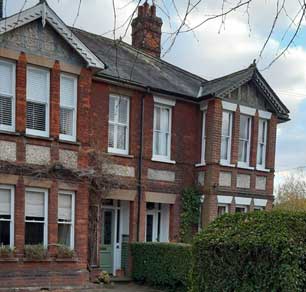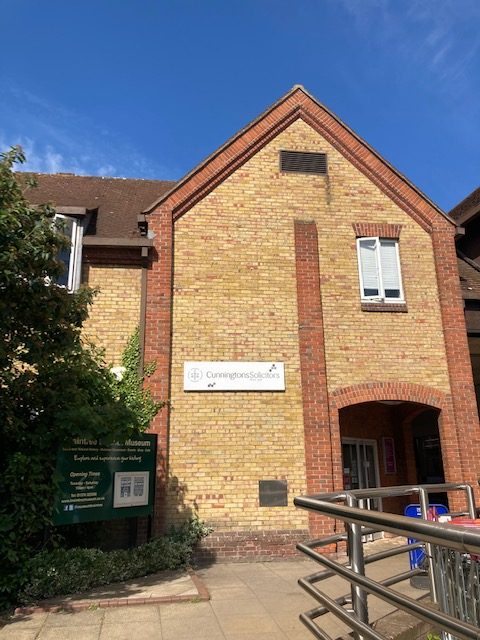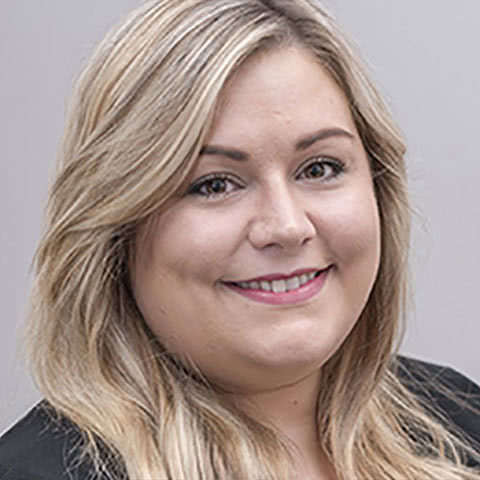> BUYING & SELLING PROPERTY
TIPS AND ADVICE
Cunningtons conveyancing solicitors in Braintree provide fixed-fee residential property legal services across North Essex and South Suffolk from our Great Square office. Based at Great Square, Braintree CM7 1UD, our property team handles buying, selling, and remortgaging across Braintree, Colchester, Ipswich, Sudbury, Bishop’s Stortford, Halstead, Haverhill, Saffron Walden, Long Melford, Witham, White Notley, Cressing, and across East Anglia.
Led by Partner Kate Horsted, we provide face-to-face conveyancing support with direct access to your dedicated case manager throughout your transaction, backed by 275 years of property law expertise since 1748.
Looking for trusted property solicitors in Braintree? Cunningtons have been providing expert residential property services from our Great Square offices since 1748.

Residential Property Services in Braintree
Our experienced Braintree property solicitors offer fixed-fee residential conveyancing with transparent pricing and fast conveyancing quotes across Essex and Suffolk.
Cunningtons solicitors have been helping property buyers and sellers throughout Braintree, Colchester, Ipswich, Sudbury, Bishop’s Stortford, Halstead, Haverhill, Saffron Walden, Long Melford, and across the region for more than 275 years.
When you use Cunningtons property solicitors for your residential property transactions, you can relax. We are regulated by the Solicitors Regulation Authority (SRA), with security written into our DNA!
Why Choose Our Braintree Property Team?
- Competitive Fixed Fees – Excellent value with no hidden costs
- Fast Conveyancing Quotes – Get your Braintree quote within hours
- Personal Contact – Speak to your dedicated property solicitor directly
- Local Branch, No Call Centre – Face-to-face service in Great Square
- 275 Years of Experience – Residential property expertise since 1748
- SRA-Regulated Excellence – Professional standards and client protection
- Essex Property Specialists – Deep knowledge of the local residential property market
- Award-Winning Service – Recognised excellence in residential property
- Completion Guarantee – We’ll see your move through to completion
- Walk-In Advice Available – Immediate advice when you need it
- Great Client Reviews – Trusted by thousands of local families
Get Your Fixed-fee Property Quote Today
Ready to move? Ordering your fixed-fee quote is easy:
4-Step Quote Process

📞 Call 0800 977 7887 for a fast telephone quote
📧 Email quotes@cunningtons.co.uk for a written quotation
🚶♀️ Visit our walk-in offices at 2 Tofts Walk, Braintree CM7 1XH
💻 Complete our form below
Property Services Across Essex
🏠 Residential Property Purchases
Whether you’re a first-time buyer in Braintree or moving to a larger family home in Colchester, our conveyancing solicitors are ready to guide you through every step of your property buying journey:
- Property searches and surveys – We run thorough legal checks on your new home.
- Mortgage lenders – We work directly with your lender.
- Contract negotiation – We protect your interests in discussions with your seller or their solicitors.
- Exchange and completion – Aiming for a smooth, stress-free moving day.
- Land Registry registration – We make sure that you are the legal owner.
- Protection from fraud – We are always on guard against fraud in your purchase.
Popular areas we serve: Braintree town centre, plus nearby Essex villages like White Notley, Cressing, Great Notley, Faulkbourne and Rayne.
🏘️ Property Sales
Selling your home in North Essex or Suffolk? Talk to our conveyancing team to ensure you have a smooth and efficient sale. We help you toward your sale by:

- Preparing your title deed – We get your paperwork ready.
- Drafting contracts – Protecting the proceeds of your sale.
- Buyer enquiry responses – We handle all queries professionally.
- Completion coordination – Timing the transaction perfectly.
- Final account statement – With a clear breakdown of all transactions.
🔄 Remortgages & Transfers
Not moving but need legal support with your property?
- Remortgage conveyancing – Switching to better mortgage rates?
- Transfers of equity – Adding or removing names from deeds.
- Buy-to-let purchases – Investment property transactions.
- Right to Buy – Buying from public sector landlords.
Online conveyancing, or face-to-face?

Using local solicitors in Braintree – like Cunningtons – means you know who you’re dealing with. You have one property solicitor assigned to your transaction, and you’re likely to have met them personally.
This means you’re dealing with someone you know personally, which helps when the matter is as important as your home.
When you deal with online firms, the service is necessarily remote, which can create problems if issues arise with your residential property.

What’s the problem?
Need advice on a legal matter? Why not visit our advice centre in Braintree to discuss your concerns with us.
Get Your Fixed Fee Property Quote in 24 Hours
Competitive rates, professional advice, and local expertise – that’s the Cunningtons approach to Essex and Suffolk residential property transactions.
Our fixed fees include:
- A dedicated solicitor for your entire move;
- All standard searches and legal work;
- Direct phone access to your conveyancing team; and
- Local knowledge of East Anglian residential property markets.
Complete the form below for your competitively-priced conveyancing quotation:
Get A Quote
Click here to order your quote from our residential conveyancing solicitors
What areas does the Braintree branch cover?
From our Braintree office, we proudly serve property buyers and sellers throughout our area.
Braintree, Colchester, Ipswich, Sudbury, Bishop’s Stortford, Halstead, Haverhill, Saffron Walden, Long Melford, Harwich, Manningtree, Hadleigh, Tiptree, and across Essex, South Suffolk and East Anglia.
Whether you’re buying in historic Colchester, selling in bustling Ipswich, or remortgaging in Sudbury, our Braintree team provides an expert conveyancing service with local knowledge that only comes from 275 years in the area.
Why Local Conveyancing Matters
❌ Avoid Online Conveyancing Pitfalls
- No personal relationship – Different person every call.
- Hidden extras – Surprise fees throughout the process.
- Delayed completions – No local knowledge causes problems.
- Poor communication – Emails are lost in automated systems.
✅ The Cunningtons Advantage
- Your dedicated solicitor – Dealing with the same solicitor from quote to completion.
- Local property knowledge – We know Essex markets inside out.
- Face-to-face meetings – At our Braintree offices in Great Square.
- Established relationships – 275 years of local connections.
- Immediate support – Call your solicitor directly.
Cunningtons Solicitors in Braintree, Essex
Great Square
Braintree
Essex
CM7 1UD
United Kingdom
Tel: 01376 326868
Fax: 01376 550003
Staff Spotlight

Kate Horsted
Conveyancing Partner
Kate Horsted is a Residential Property solicitor and partner working from our Braintree office, providing professional advice to clients across Essex.
GET IN TOUCH
To contact us about any of our legal services including Family Law or Wills and Probate,
just complete this form so we can get back to you.
Frequently Asked Questions
Here are some questions that our Braintree branch gets asked: if you need an answer to a question that is not on this list, please contact us for an answer.
Should I use an online conveyancing company?
We do not generally recommend using online services; though you often pay slightly lower fees, the level of professional advice will also be lower. You will rarely speak to the same person twice, and you have to be wary of extras they add on.
When dealing with something as valuable as your home, it’s important not to take risks. You should meet the property solicitor working on your case face-to-face.
What is the difference between a conveyancing solicitor and a conveyancer?
A conveyancing solicitor is regulated by the Solicitors’ Regulation Authority (SRA), is a member of the Law Society, will have degree-level qualifications and at least two years of on-the-job training before qualifying.
Whereas a conveyancer tends to be regulated by the Council for Licenced Conveyancers (CLC) and is usually less qualified, although they can still be competent.
How do I avoid fraudulent transactions when moving house?
With such large amounts of money changing hands, there can be attempts to steal them in transit.
It is easy to avoid fraud if you follow simple rules:
1 Never ever disclose bank account details by email; your property solicitors will tell you other ways to pay your legal fees.
2 Never pay money into an account whose details you have received by email.
3 Both you and your solicitor should pay into accounts whose details you have received by phone or in person.
4 Ideally, test the veracity of bank account details by making an initial payment of £1 – which you then verify by telephoning your conveyancing solicitor – before paying any more.
What happens in the conveyancing process?
The property process transfers ownership whenever UK residential property is bought, sold or remortgaged. The process differs for each transaction, and generally involves liaising between buyers, sellers, mortgage companies, local councils and the Land Registry.
Talk to your property solicitor throughout the process and they’ll keep you up-to-date.
When I ask for a conveyancing quote, do I have to pay anything?
All our property quotes are free and you are not obliged to use us.
However, we have found that most people who receive a quotation for our conveyancing services are happy to use us and remain loyal customers for future moves!
Is there a difference between freehold and leasehold conveyancing?
The short answer is yes.
When dealing with leasehold transactions, there are many more things to check during the conveyancing process, including ground rent, service charges, licences under the Lease and leasehold covenants (obligations).
For this reason we charge an additional fee for dealing with leasehold transactions.
How long does conveyancing take?
As most home moves depend on different factors, it’s impossible to predict how long your transaction will take. However, on average the process usually takes about 8 weeks for freehold residential property, and slightly longer for leasehold.
But as there can be a number of transactions in a chain, the process rarely depends on just one person.
What searches does a conveyancing solicitor do?
The standard searches your property solicitor undertakes are:
local authority,
water/drainage, and
environmental.
There are other searches depending on the locality of the property. For example, in mining areas a mining search is always obtained.
There may also be searches for Gypsum, Lead Mining, China Clay, and Limestone.

